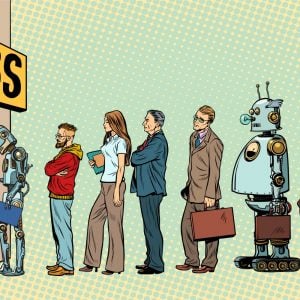Imagine a world where a single corporation reigns supreme power over all. Like an umbilical cord to an unborn child, this company provides the precious and necessary resources to any that wish to thrive.
It collects billions of terabytes of data with its millions of CPUs, every minute, constantly churning and processing at speeds that are unfathomable to many.
Growing ‘smarter’ every day it has the ability to connect billions of products and services to billions of people, in nanoseconds. Those that feed the connection with valuable raw data are rewarded accordingly and life gets better for those people.
If, however one was to break the rules and be restricted from the connection, their organisation will most certainly fail and die due to lack of insight and inability to compete with those who remain connected.
The rules are made, of course, by the corporation and the corporation decides whether you are or are not worthy of its precious connection.
Sounds like a science fiction movie, but it could be the reality of at least one of our dystopian futures. A single organisation who provides connectivity to a private neural network.
This network comprises of the billions of terabytes of data, but more importantly, it is all meaningfully interpreted and organised to deliver the most precise and efficient value anyone has ever experienced.
Can one company rule the roost?
There are some people that say, one company simply can not win the AI race, that it is a collective resource and that neural networks are distributed and owned by many.
To some degree, I agree with that sentiment, however, I also believe that the true power and growth of AI lies in its ability to interpret and implement in the most efficient ways possible. Bob Picciano, Senior Vice President, Information and Analytics at IBM, identified big data as the new natural resource.
Therefore if we say that big data is the worlds largest natural resource, then the algorithms that power AI are the machinery fuelled by the resource.
My view is that the core of the AI revolution is going to be somewhat a reverse of what we saw in the industrial revolution. During the industrial revolution, the unequal power went to those who could produce and distribute the recourses, think of oil companies, mining companies, etc.
These were a few very large and powerful companies in large markets (oligopoly’s and monopolies). The manufacturers consumed the resources to create value-added output, such as steel, cars, products, etc. Although there were a few large powerful companies that produced, the majority of the production companies were small and medium-sized firms that had lots of competition.
AI: just like the industrial revolution, just in reverse!
With AI, this will be reversed, the ‘natural’ resource (big data) will be provided by many smaller contributors who will collect data in many different, innovative ways and the value-add will be how that data is translated and converted to value (AI Algorithm and hardware).
The reason I believe this will be the case is due to one thing, efficiency. The ability of one central and private network to crunch data, interoperate it and deliver will be much higher than any smaller operator and therefore the smaller operator will (out of logic) enlist the services of the larger organisation.
If Ai was like an oil refinery, imagine if you took every stage of the refinery process and placed it among different companies with different rules and regulations.
It would be foolish to assume that you could manufacture finished fuel in any efficient manner.
Conclusion
The fundamentals that fuelled the rise of the ‘corporation’ will also fuel the rise of AI. At the epicentre will be the king of efficiency, a leader that can process and deliver the raw and semi-processed data into a more coveted valuable output, such as increased sales, the latest vehicle design or even city planning and design.
All this will be driven ultimately by cost reduction and speed to market.


